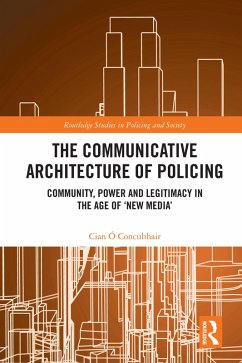The book describes the lived experiences of journalists through the collapse of the local news media in England: declines wrought in large part by the advent of social media. It also describes a crisis of confidence in local journalism and its perceived institutional status in the local community. By contrast, the book charts the emergence of an empowered, professional police communicator class in policing--and its distinctive cultural features--rooted in the mass communications potential of social media. The book weaves together these empirical insights by developing novel approaches to police legitimacy theory and institutional power relations.
This book will be of interest to students, scholars and practitioners in the fields of criminology, media studies, communication studies, journalism and policing.
Dieser Download kann aus rechtlichen Gründen nur mit Rechnungsadresse in A, B, BG, CY, CZ, D, DK, EW, E, FIN, F, GR, HR, H, IRL, I, LT, L, LR, M, NL, PL, P, R, S, SLO, SK ausgeliefert werden.









